| |
|
Ancient Unsolved Mystery - Hundreds
of Glowing Metallic Spheres
Almost Like An Underground Planetarium |
|
Hundreds of strange metallic
mysterious glowing spheres have been unearthed beneath an ancient
temple. The purpose of these spheres remains an unsolved mystery for the
moment. It looks almost like a wonderful underground planetarium. |
The spheres were found beneath Mexico's Temple of the Feathered
Serpent by a robot named Tláloc II-TC, which was deployed by
archaeologists exploring a tunnel and series of chambers beneath the
ancient ruins. Equipped with an infrared camera, Tlaloc II-TC has the
ability to scan the area to generate a 3D picture.
Exploring the tunnel, that was deliberately filled with debris and ruins
by the Teotihuacan people, required several years of preliminary work
and planning. Based on the robot's information of an unexcavated portion
of the tunnel, archeologists discovered that they needed to remove 30
more meters of debris in the tunnel to reach the three chambers.
Inside the chambers there were hundreds of glowing spheres which
archeologists believe were placed inside at the last closing of the
tunnel about 1,800 years ago. |
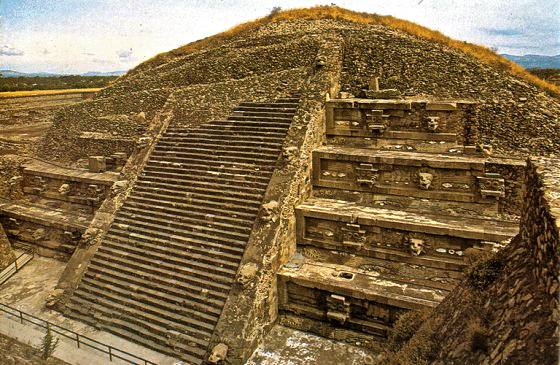 |
| Several of the chambers in the tunnel are thought to have been used
by Teotihuacan royalty for rituals and burials and it is possible the
spheres played an important role in some ceremonial procedures. |
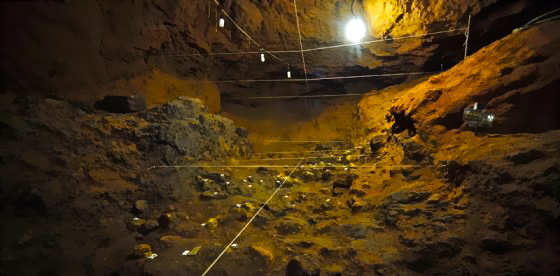
Glowing Spheres in the Temple of the Feathered Serpent |
There are hundreds of spheres in the chambers. The purpose of the
glowing spheres remains a mystery. We do not know their meaning. We can
not yet establish its role because it is an unprecedented discovery.
According to archeologists, the tunnel was sealed twice by the
Teotihuacan people. Thick walls, erected to block access, were
demolished about 1,800 years ago in order to deposit something very
important in the central chamber at the end of the tunnel. Obviously the
metallic spheres were, for unknown reason not meant to be found by
future generations.
"We believe that high-ranking people, priests or even rulers, went
down to the tunnel to perform rituals," archeologists said. |
| A sphere, ranging from 4 to 12 inches and have a core of clay with
organic matter, then covered them with pyrite, a mineral that underwent
a process of oxidation and became jarosite, hence have a tone yellow,
according to the National Institute of Archaeology and History. Pyrite
was certainly used by the Teotihuacanos and other ancient Mesoamerican
society. Originally the spheres would have shown brilliantly. They are
indeed unique, but we have no idea what they mean. |
 |
 |
|
 |

The Hidden History of the Human Race
Klaus Dona comes from the art world. As Art Exhibition Curator for
the Habsburg Haus of Austria, Klaus has organized exhibitions world
wide.
With this background his approach to archeology is unconventional. He
has traveled the world in search of unique and unexplained findings.
Intrepid and unrelenting, he is on a mission to bring to the eye of the
public bones, skulls, carvings and sculptures in forms that do not fit
into the contemporary view of our timeline.
Klaus presses on to discover the real mysteries, going down through the
centuries and excavating artifacts that science does not allow for,
revealing the existence of physical proof that humanity has barely
grazed the surface of our heritage here on Earth. |
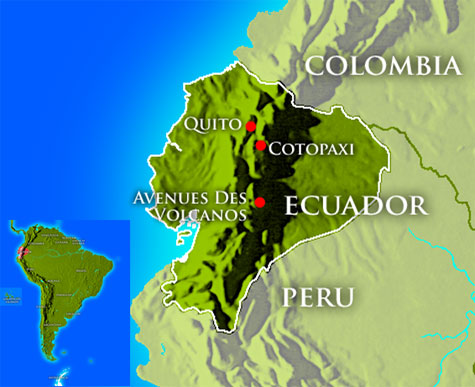 |
 |
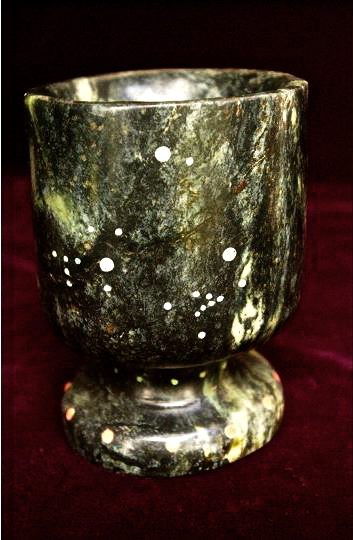
And on the big cup you can see a perfect inlaid star constellation
showing the Orion and other stars. And inside the big cup it is very,
very magnetic and outside the cup nearly nothing. Professional
geologists are saying this is impossible because if a stone has metal
particles inside the stone, it must be same magnetic from both sides. |
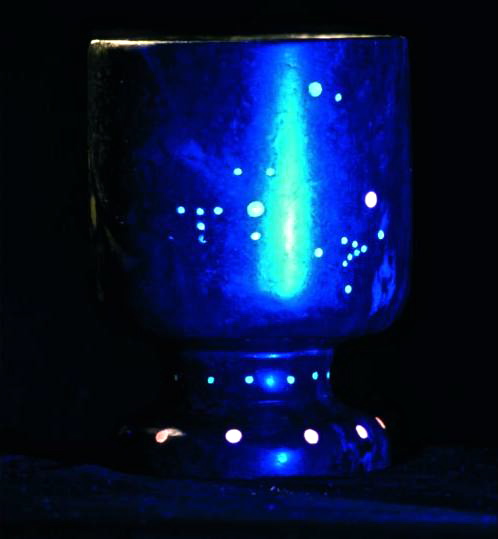
Here you have a close-up of the big cup and you can see a perfect
inlay of star constellations and they are shining very brightly if you
put black light on it.
|

Another piece, [left] a jade plate with the same star constellation
inlay like on the big cup and two persons facing the sky. And on the
next picture [right] you can see that also the eyes of these two statues
and the star constellation is shining very strongly under black light. |
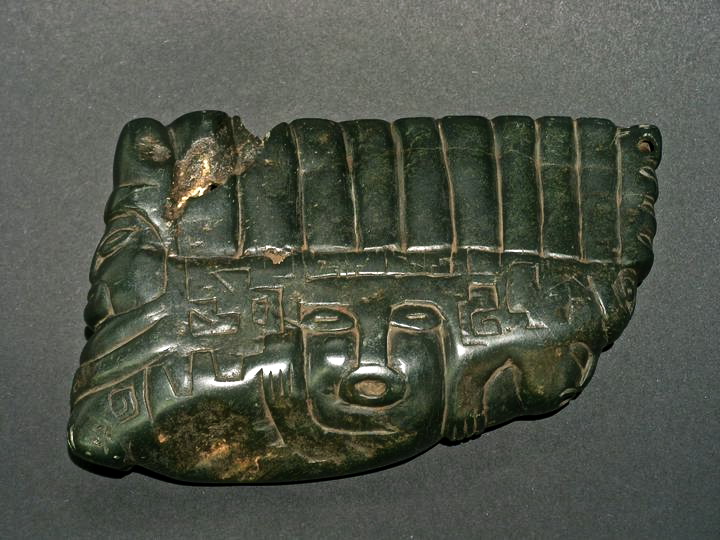
Here you can see a stone flute. The strange thing is that the
vibration of the sound of these stone flutes is exactly the same as our
brainwaves. So that means maybe those flutes were used for meditation or
for healing purposes. And each two holes are connected perfectly with
each other. That means you can make perfect holes into this very, very
hard stone, but how you connect, with simple tools, the two holes on the
bottom? This would be even in our days a very difficult work to do.
|
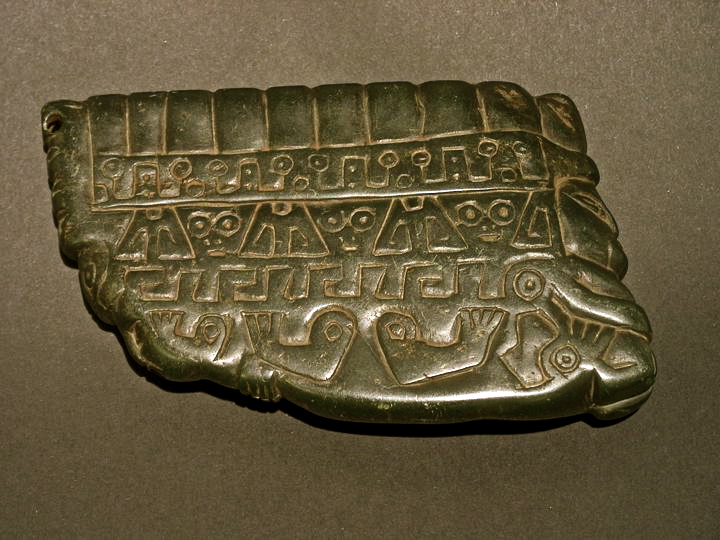
BR: Because it's in the shape of a "U" and it curves round inside the
stone?
KD: That's right, and with simple tools you are definitely not able to
do such a work; and even the holes are very precise.
|
|
 |
 |
In the remote Kamchatka peninsula (see map), 200 km from Tigil,
University of St. Petersburg archaeologists discovered a strange fossil.
The authenticity of the find has been certified. According archaeologist
Yuri Golubev, occurs that, in this case the discovery surprised
scientists by its nature, at least – unusual, able to change history (or
pre-history).
We got a call from the prefec of Tigil. He told us that hikers that were
walking in place, found these remains in rock. We went to the place
indicated, and initially we not understand what we saw. There were –
hundreds of toothed cylinders which appeared to be parts of a machine. |
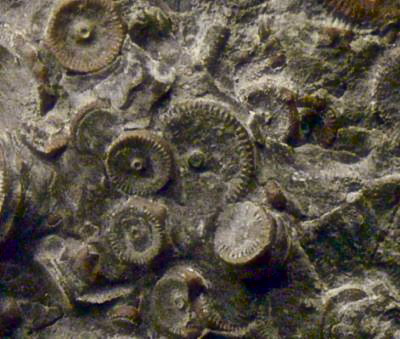 |
It is not the first time that an artifact, an ancient object,
something like this is found in that region. But, surprisingly
conserved, this specific artifact is – at first glance, inlaid in rock
(which is understandable since the peninsula is home to numerous
volcanoes). Subjected to analysis, the conjunct showed to be made of
metal parts that seem to form a mechanism, a gear which may be of a type
of watch or computer. The astonishing is that all the pieces were dated
in 400 million years! Yury Gobulev commented:
They were in perfect state of conservation, as if they were frozen in a
short period of time. It was necessary control the area, because soon
the curious began to appear in large numbers. Other scientists, American
geologists, defined the piece as an amazing and mysterious artifact.
Nobody could believe that 400 million years ago could have existed on
Earth even a man [even more a machine]. At that time, the forms of life
were very simple, but the finding, [simply] – clearly suggests the
existence of intelligent beings capable of such technology. It was found
also that the parts have reached to the fossilization state in a period
of time historically and geologically short. Possibly, the “machine”
fell into a swamp. |
| Despite the findings, cautious, scientists prefer to consider that
the evidences are not definitive – yet. And Gobulev ponders: Refuse the
existence of technology, even in the past, is a serious mistake because
evolution is not linear. |
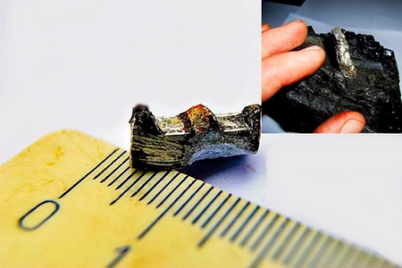 |
 |
| Lighting the fire during a cold winter evening a resident of
Vladivostok found a rail-shaped metal detail which was pressed in one of
the pieces of coal that the man used to heat his home. Mesmerized by his
discovery, the responsible citizen decided to seek help from the
scientists of Primorye region. After the metal object was studied by the
leading experts the man was shocked to learn about the assumed age of
his discovery. The metal detail was supposedly 300 million years old and
yet the scientists suggest that it was not created by nature but was
rather manufactured by someone. The question of who might have made an
aluminum gear in the dawn of time remains unanswered. Nowadays,
finding a strange artifact in coal is a relatively frequent occurrence.
The first discovery of this sort was made in 1851 when the workers in
one of the Massachusetts mines extracted a zinc silver-incrusted vase
from a block of unmined coal which dated all the way back to the
Cambrian era which was approximately 500 million years ago. Sixty one
years later, American scientists from Oklahoma discovered an iron pot
which was pressed into a piece of coal aged 312 million years old. Then,
in 1974, an aluminum assembly part of unknown origin was found in a
sandstone quarry in Romania. Reminiscent of a hammer or a support leg of
a spacecraft “Apollo”, the piece dated back to the Jurassic era and
could not have been manufactured by a human. All of these discoveries
not only puzzled the experts but also undermined the most fundamental
doctrines of modern science.
The last property of the object that puzzled the scientists was its
distinctive shape which was reminiscent of a modern tooth-wheel. It is
hard to imagine that an object could take regular shape of a tooth-wheel
with six identical ‘teeth’ naturally. Moreover, the intervals between
the ‘teeth’ of the gear are curiously large in relation to the size of
the ‘teeth’ themselves which might mean that the detail was a part of a
complicated mechanism.
The coal in which the metal object was pressed was delivered to
Primorye from Chernogorodskiy mines of Khakasia region. Knowing that the
coal deposits of this region date 300 million years back, Russian
experts inferred that the metal detail found in these deposits must be
an age-mate of the coal.
The object was found to be composed of 98 percent aluminum and 2
percent magnesium. On the one hand, such an alloy stalled the scientists
because nearly pure aluminum is very rarely found in nature. Thus, the
detail was most definitely created artificially. |
|
